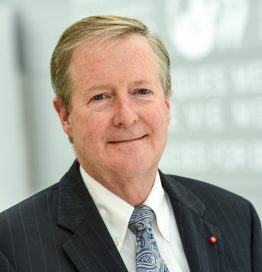On May 10, 2023, KEI held a special hybrid rollout event for the inaugural volume of its new flagship journal, Korea Policy. Event description below: “Like our previous publications, Korea Policy…
Our Team

Email Randall S. Jones
About Randall S. Jones
Dr. Randall Jones is a non-resident distinguished fellow at the Korea Economic Institute and a Professional Fellow at Columbia University’s Center on Japanese Economy and Business. Previously, he served as the Senior Counsellor for East Asia and as Head of the Japan/Korea Desk at the Organization for Economic Cooperation and Development (OECD) in Paris from 2002 until August 2019. During his 30 years at the OECD, Dr. Jones wrote all 16 OECD Economic Surveys of Korea and 15 OECD Economic Surveys of Japan, in addition to a number of other publications. In recognition for his work on Japan and Korea, Dr. Jones received the Decoration of the Order of the Rising Sun from the Government of Japan and the Sungnye Medal of the Order of Diplomatic Service Merit from the Government of Korea in 2018. Before joining the OECD in 1989, he spent three years in the U.S. government, serving at the Council of Economic Advisers and as an advisor in the State Department. Dr. Jones was also the vice-president of the Japan Economic Institute in Washington. Dr. Jones received a B.A. in Economics from Brigham Young University and a PhD in Economics from the University of Michigan in 1984. He lived in Korea from 1974 to 1976.
May 18, 2023
Russia’s invasion of Ukraine is having a serious impact on the global economic recovery from the COVID-19 pandemic. After a 3.6% drop in 2020, world GDP rebounded with 6.1% growth in 2021 (Table 1), reflecting progress in controlling the coronavirus and exceptionally strong fiscal and monetary measures to offset the impact of the pandemic. In…
April 20, 2022
Labor market dualism – the segmentation between regular and non-regular workers -- is deeply entrenched in Korea’s labor market. Regular workers receive higher wages and social insurance coverage and a high degree of job security, while non-regular workers receive lower wages, are less likely to be covered by social insurance and work in precarious jobs.…
March 9, 2022
The potential growth rate – the level of output that an economy can produce at a constant inflation rate – in Korea has declined steadily from 5.0% during 1997-2006 to 2.7% during 2017-20, according to the OECD (Figure 1). The OECD projects that it will slow further to 2.2% from 2021-23. The Bank of Korea…
January 26, 2022
Korea’s real GDP increased 1.2% (saar) in 2021Q3, a significant slowdown from the first two quarters of the year, reflecting a decline in private consumption (table below). A tightening of social distancing measures since July, aimed at slowing a fourth wave of COVID-19 infections, reduced spending on “consumer-facing services”. For example, demand in the food…
November 12, 2021
Korea is pursuing a bold strategy in an effort to achieve a paradigm shift that results in a fair economy. Some of its major initiatives – notably sharp increases in…
July 30, 2019
The tax burden in Korea—at 26 percent of gross domestic product (GDP) —was well below the average of the member countries of the Organization for Economic Cooperation and Development (OECD)…
May 25, 2011
Korea is in the midst of the most rapid demographic transition of any member country of the Organization for Economic Cooperation and Development (OECD); the share of Korea’s population older…
May 25, 2011
September 23, 2022
The conversation will be livestreamed on YouTube.
